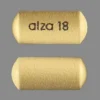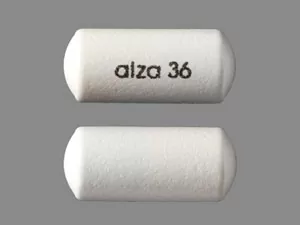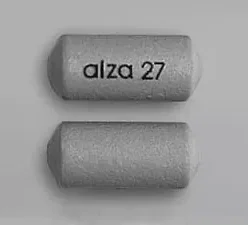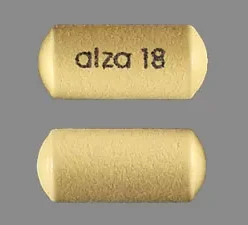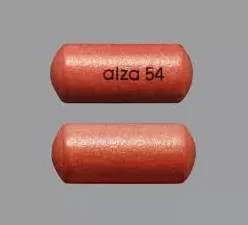$370.00 – $1,012.20
Concerta is a prescribed medication used to treat Attention Deficit Hyperactivity Disorder (ADHD) and narcolepsy. The brand name Concerta is used to sell methylphenidate hydrochloride medication. Concerta 36 mg is a central nervous system (CNS) stimulant. A doctor’s consultation needs if the patient feels uneasy after taking it. Do not take an overdose of the medication if you miss the previous one. It may life threaten the patient.
Concerta medication is a stimulant that increases attention and decreases impulsiveness and hyperactivity in patients. This medication is available in an Extended-Release form. Concerta 36 mg is not recommended for use in children less than 6 years and elderly over 65 years because it has not been studied in these age groups.
It is available in the Actavis methylphenidate ER tablets with a generic. This means that the medicine releases the active ingredient slowly and the outer layer of the tablet dissolves right after it is swallowed in the morning, giving an initial dose of methylphenidate hydrochloride.
Your doctor may have prescribed Concerta 36 mg for another reason. Ask your doctor if you have any questions about why this medicine has been prescribed for you/your child.
What Does Generic Concerta 36 mg Look Like:
Concerta is available in four tablet strengths. They are extended-release tablets such as Concerta 18 mg, Concerta 27 mg, Concerta 36 mg, or Concerta 54 mg of Methylphenidate. It is oral administration with a 12-hour duration of effect once a day.
The looks of each strength of Concerta differ from each other. Concerta 36 mg is in capsule-shaped each white-colored extended-release tablet. It contains 36 mg of methylphenidate HCl and is printed with “alza 36”.
Before You Take Concerta 36 Pill:
To reduce side effects there need to know how and when to take the medicine, how much to take, and for how long. Ask your doctor about any terms or directions you do not understand.
Do not take Concerta 36 mg if you/your child have an allergy to:
- Methylphenidate hydrochloride (the active ingredient in Concerta) or any of the other ingredients in Concerta.
- Look carefully at the product description at the end of this leaflet for a list of ingredients.
- Symptoms of an allergic reaction may include rash, itching, or hives on the skin; shortness of breath, difficulty breathing; swelling of the face, lips, tongue, or other parts of the body.
Do not take Concerta 36 mg if you/your child have any of the following medical conditions:
- Glaucoma (increased pressure in the eye) is a poorly controlled overactive thyroid gland.
- Heart problems include severe angina (chest pain), irregular heartbeat, and high blood pressure (untreated or not under control).
- Severe depression, anorexia nervosa, suicidal tendencies, or other mental illnesses.
How To Use Concerta 36 mg:
Concerta 36 mg comes in the form of a tablet and is indicated in the treatment of ADHD. It works by affecting chemicals in the brain and nerves that contribute to hyperactivity and impulse control.
With the prescription of the doctor, you should take an exact dose. Take it morning time with a glass of water. Do not break or chew it because it may be low in quality. Common side effects may include a headache, nausea, and stomach pain. Go to your doctor for a decrease in side effects.
How Does Concerta 36 mg Work?
Concerta works as a stimulant to improve thinking and attention by increasing dopamine and norepinephrine, which are brain chemicals that play a role in ADHD.
- Dopamine cuts down on background noise in brain circuits and that helps people with ADHD to focus on activities such as math homework. Thus it is associated with pleasure, it is also linked to motivation.
- Norepinephrine is known for alertness situations, and can also help people stay on task with quieter activities such as studying.
Concerta make a people calming effect on ADHD, and it helps them to focus better and ignore distractions.
Taking Other Medicines:
Before taking Concerta 36 mg tell your doctor or pharmacist if you/your child are taking any other medicines, including a prescription from a pharmacy, or supermarket.
In particular, tell your doctor or pharmacist if you/your child are taking any of the following:
- Monoamine oxidase (MAO) inhibitors such as phenelzine, selegiline
medicines that increase blood pressure.
- Medicines used to treat depression or anxiety such as venlafaxine, sertraline, amitriptyline, Ativan, Celexa, Lexapro, Klonopin, Xanax, Luvox, Paxil, and imipramine.
- Pain relief medication such as Codeine, Dilaudid, Gabapentin, Hydrocodone, Lortab, Norco, and Opana ER.
- Antipsychotic medicines such as olanzapine, risperidone, and quetiapine are used to improve the symptoms of certain types of mental illness, e.g. schizophrenia and bipolar disorder.
- Other medications that affect serotonin, such as amphetamines, fentanyl, lithium, tramadol, Oxycontin, Oxycodone, Hydrocodone, Gabapentin, Lortab, Percocet, Dilaudid, Methadone, Roxycodone, Soma, Codeine, triptans (eg, almotriptan, eletriptan, or sumatriptan),
These medicines may affect Concerta 36 mg positively or negatively. Your doctor or pharmacist can tell you whether you will give up the medicines or not.
Overdosage:
The severity of a drug overdose depends on the drug, the amount taken, and the physical and medical history of the person who overdosed. Different signs and symptoms can occur when a person overdoses and everyone responds differently. Signs and symptoms depend on a variety of factors including:
- Which substance they took
- How much they took
- How they took it
- Their state of health
- Their age
- Other factors.
Symptoms of a drug overdose may include:
- Nausea and vomiting
- Severe stomach pain and abdominal cramps
- Diarrhea
- Chest pain
- Dizziness
- Loss of balance
- Loss of coordination
- Agitation
- Paranoia
- Slow or erratic pulse
- Difficulty breathing, shallow or erratic breathing, or not breathing at all
- Hallucination
- Visual disturbances
- Choking or gurgling sounds
- Snoring deeply
- Blue fingernails or lips
If you think someone may have taken an overdose but they are not showing any symptoms and seem okay, call the doctor immediately.
Concerta 36 mg Taking During Pregnancy & Breastfeeding:
If you are pregnant or breastfeeding, think you may be pregnant, or are planning to have a baby, consult with your doctor for advice before taking this medicine.
It may be risky when you use this medicine during the first three months of pregnancy. Your doctor can give you more information about this risk.
Talk to your doctor or pharmacist before using Concerta 36 mg in case of:
- Have sexual intercourse and take any birth control pills for birth control.
- Concerta 36 mg passes into breast milk to the baby during breastfeeding. Therefore, your doctor will decide whether you should breastfeed while taking this medication or not.
Ability To Drive And Use Machines After Taking Medicine:
You or your child may feel dizzy, have trouble focusing, or have blurred vision while taking Concerta 36 mg. If this is the case, certain activities such as driving, operating machinery, cycling or horseback riding, or climbing trees can be dangerous. The doctor always avoids doing this work.
Some Simple Rules:
Make sure your medication is as effective as possible if you follow some important rules before and after taking the medication. Some simple rules can make the taking of necessary medicines safer. Such as:
- Read the label on the container and, if you don’t understand something ask the doctor or pharmacist.
- If a doctor prescribes a medicine for you, make sure the doctor knows all the other medicines you are taking. This includes any prescription, over-the-counter and complementary medicines, as well as any herbal preparations.
- Read the Consumer Medicines Information leaflet for your medicine i.e. warnings, and interaction precautions printed on all medicine labels and packages.
- Take medicine with a full glass of water.
- Don’t stir medicine into your food, chew or crush tablets, or pull capsules apart (unless your doctor tells you to do so), because this may change the way the drug works.
- Never mix medicine into hot drinks, because the heat from the drink may destroy the effectiveness of the drug.
- If you are having trouble remembering the timing of your medicines, consider getting a pill dosing dispenser or organizer, or setting a medication reminder.
- Never take medicine with alcoholic drinks.
- Don’t take vitamin pills at the same time you take medicine without informing your doctor because vitamins and minerals can interact with some drugs.
Go to the doctor immediately if you feel uneasy after taking the medication.
| Quantity | 30 pills, 60 pills, 90 pills |
|---|
Related products
Concerta
Concerta
Concerta

